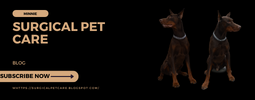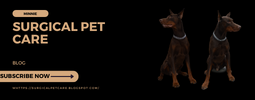Caring for Your Pet After Surgery: Tips for a Successful Recovery in 2023, At some point in your pet's life, they may require surgery, whether it's for a routine procedure such as spaying or neutering or a more complex operation.
While surgery is often necessary to maintain your pet's health, it can be a stressful and overwhelming experience for both you and your furry friend.
Here are some tips to consider when caring for your pet after surgery:
- Your vet will provide specific instructions on how to care for your pet after surgery, including medication schedules, activity restrictions, and wound care. It's important to follow these instructions carefully to ensure your pet's speedy recovery.
- Monitor your pet's incision: Keep an eye on your pet's incision site for any signs of redness, swelling, or discharge. If you notice anything concerning, contact your vet immediately.
- Help your pet rest: After surgery, it's important for your pet to get plenty of rest. Make sure they have a comfortable, quiet place to rest where they won't be disturbed. Encourage them to sleep by keeping the room dimly lit and quiet.
- Provide pain management: Surgery can be painful, so it's important to make sure your pet is comfortable. Your vet may prescribe pain medication, and it's important to give it to your pet as directed.
- Help your pet with mobility: Depending on the type of surgery, your pet may need help with mobility. If your pet is having trouble walking or getting up, consider using a ramp or sling to assist them.
- Offer easy-to-digest food: Your pet's digestive system may be a little sensitive after surgery, so it's important to offer them easy-to-digest food. Your vet may recommend a specific type of food or suggest offering small, frequent meals throughout the day.
- Keep your pet's environment clean: Keep your pet's environment clean and free of any potential hazards. Make sure their bedding is clean and dry, and keep them away from any areas where they could slip or fall.
Remember, every pet is different, and their recovery will depend on the
type of surgery they had and their individual needs.
Always consult with your vet if you have any questions or concerns about your
pet's recovery after surgery.
After the surgery is complete, the real work begins:
Caring for Your Pet After Surgery.
Follow these tips to help ensure a successful recovery and minimize the risk of complications.
Follow Your Vet's Post-Surgery Instructions
Your veterinarian will provide you with specific instructions on how to care for your pet after their surgery.
It's important to follow these instructions closely to ensure the best possible outcome for your pet.
This may include instructions on how to administer medications, how often to change bandages, and when to schedule follow-up appointments.
Monitor Your Pet's Incision Site
After surgery, your pet will have an incision site that needs to be monitored for signs of infection or other complications.
Keep an eye out for redness, swelling, or discharge from the site, and notify your veterinarian if you notice anything unusual.
Limit Your Pet's Activity
It's important to limit your pet's activity during their recovery period to prevent them from injuring themselves or damaging their incision site.
Your veterinarian will provide specific instructions on how long your pet should rest, but in general, you'll want to keep them calm and quiet for several days or weeks after the surgery.
Provide a Comfortable Environment
Your pet may need extra TLC during their recovery period, so make sure they have a comfortable environment to rest in.
This may include a cozy bed, soft blankets, and a quiet space away from other pets or noisy areas of your home.
Encourage Proper Nutrition
Proper nutrition is essential for a successful recovery after surgery.
Your veterinarian may recommend a specific diet or feeding schedule for your pet during their recovery period.
Make sure your pet has access to plenty of water and easy-to-digest foods, and avoid feeding them anything that could cause digestive upset.
Use a Surgical Pet Shirt Instead of an Elizabethan Cone
While Elizabethan cones, also known as "e-collars," are a common way to prevent pets from licking or biting their incision site after surgery, they can be uncomfortable and stressful for your pet.
An alternative option is a surgical pet shirt, which covers the incision site and prevents your pet from accessing it without restricting their movement or vision.
Consult with your veterinarian to see if a surgical pet shirt is a good option for your pet's recovery.
Schedule Follow-Up Appointments
Your veterinarian will likely schedule follow-up appointments to monitor your pet's progress and ensure a successful recovery.
Make sure to attend these appointments and follow any additional instructions your veterinarian provides.
By following these tips and working closely with your veterinarian,
you can help ensure a successful recovery for your pet after surgery.
While the recovery period can be challenging, with patience, care, and attention, your furry friend will be back to their happy and healthy self in no time.






0 Comments